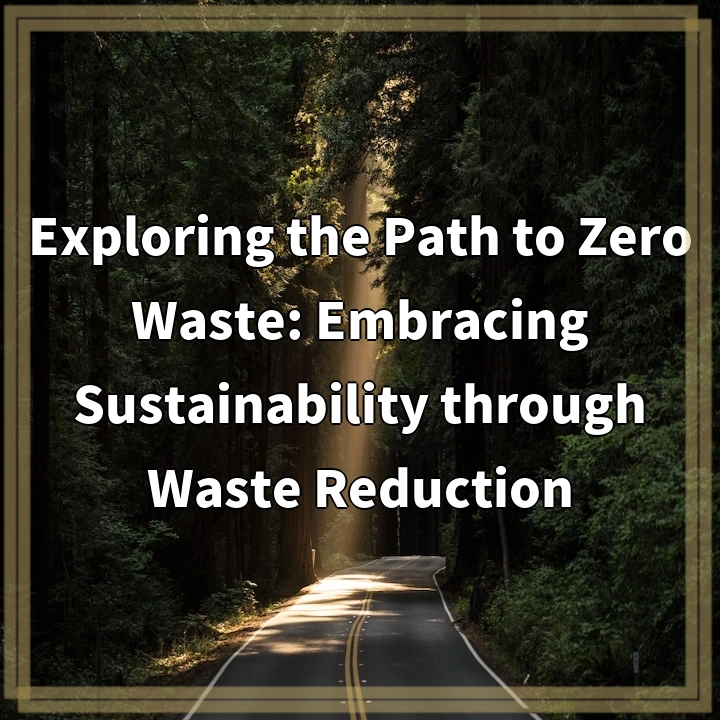
What is Zero Waste?
Zero Waste is a movement and lifestyle that aims to minimize waste production and maximize resource efficiency. It promotes the idea of reducing, reusing, recycling, and composting to divert waste from landfills and incineration facilities. The ultimate goal of zero waste is to create a circular economy where all materials are used and consumed in a sustainable way.
Exploring the Path to Zero Waste
Embracing a zero waste lifestyle involves adopting sustainable practices that reduce waste at its source. This includes making conscious choices as consumers, such as opting for reusable products over single-use items, embracing bulk shopping, and choosing products with minimal packaging.
Implementing recycling and composting systems in households, businesses, and communities is also crucial. It not only helps divert waste from landfills but also allows valuable resources to be reused or returned back to the soil.
Furthermore, the concept of upcycling – creatively repurposing items that would otherwise be discarded – is gaining popularity in the zero waste movement. This approach encourages people to find new uses for old items, prolonging their lifespan and reducing the overall demand for new products.
Another critical aspect of the path to zero waste is the emphasis on reducing food waste. With a staggering amount of food wasted globally, initiatives that raise awareness about preventing, redistributing, and composting food waste are vital.
Real-world Problems Associated with Zero Waste
While the zero waste movement holds great potential for mitigating the environmental impact of waste, it also faces several challenges.
Infrastructure and Accessibility:
One of the major hurdles in achieving zero waste goals is the lack of adequate infrastructure and accessibility to proper waste management facilities. Many communities still do not have comprehensive recycling or composting programs, making it difficult for individuals to properly dispose of their waste in an eco-friendly manner.
Consumer Habits and Convenience:
Consumer habits and convenience play a significant role in the success of the zero waste movement. Breaking away from the convenience of single-use items and embracing sustainable alternatives requires a shift in mindset and behavior. Additionally, limited availability and higher costs of eco-friendly products can discourage some consumers from making sustainable choices.
Corporate Responsibility:
The responsibility falls not only on consumers but also on corporations to adopt sustainable practices. Many companies continue to produce excessive packaging and disposable products, contributing to the global waste problem. Encouraging businesses to implement sustainable packaging and production methods is crucial for achieving zero waste goals.
Addressing these real-world problems is essential for the successful implementation of zero waste principles. By working together, communities, individuals, and businesses can make tangible progress towards a sustainable, waste-free future.

Solutions for Zero Waste
Addressing the real-world problems associated with zero waste requires concerted efforts from individuals, communities, and businesses. Here are some solutions:
Investing in Waste Management Infrastructure:
Communities and governments should prioritize the development of comprehensive recycling and composting programs. Accessible recycling facilities and composting centers can help individuals properly dispose of waste and divert it from landfills. This includes expanding recycling collection services, establishing drop-off locations, and promoting the use of compost bins.
Education and Awareness:
Raising awareness about the importance of zero waste and providing educational resources can help shift consumer habits. Informing individuals about the environmental impact of waste, the benefits of sustainable alternatives, and practical tips for reducing waste can inspire action. Encouraging schools, community centers, and organizations to incorporate waste reduction into their curriculum and outreach initiatives is key.
Promoting Sustainable Consumer Choices:
Making sustainable alternatives more accessible and affordable can encourage consumer behavior change. Governments and businesses should work together to implement policies that reduce plastic packaging, incentivize the use of reusable products, and support eco-friendly businesses. Additionally, providing information and resources to help individuals make informed purchasing decisions, such as eco-labels and sustainable product directories, can empower consumers.
Engaging businesses in the zero waste movement is crucial. Encouraging companies to adopt sustainable packaging practices, use recycled materials, and implement circular economy models can have a significant impact on waste reduction. Collaborating with businesses through partnerships, incentives, and shared responsibility initiatives can drive positive change at a larger scale.
Advocacy and Policy Change:
Raising the profile of zero waste and advocating for stronger waste reduction policies can create systemic change. This includes advocating for extended producer responsibility, implementing waste reduction targets, and supporting legislation that incentivizes sustainable practices. Engaging with local and national policymakers, joining environmental organizations, and actively participating in public consultations can help shape policies in favor of zero waste principles.
By implementing these solutions, we can move closer to a zero waste society, where resources are utilized efficiently, waste is minimized, and the environment is protected for future generations.















